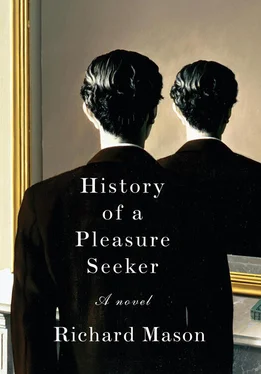“What if we’re caught?”
“You’ll be set off the ship at the next port. I’ll be dismissed. There are worse places to be stranded together than Madeira. Believe me, first class will be much more to your taste.”
Piet shook his head, still looking out to sea. “You’ve already lost one place because of me. Unlock the gate and disappear. I’ll come through alone. That way only I end up in Madeira if things go wrong.”
This was not at all the outcome Didier sought. However, the conversation had lasted too long already. “All right. Once you’re through the grille, slide it closed behind you but leave it off the latch. Walk down the corridor. Open the door, go up the main staircase. I’ll be in the Winter Garden at the top. It’s fairly quiet until four.”
Half an hour later, wearing one of his two good shirts and feeling more cheerful, Piet Barol slipped into the deserted corridor behind the tourist-class reading room and let himself through the open grille at its end. He was about to open the baize door to first class when a steward came through it.
“May I help you, sir?”
Piet was aware that the faintest trace of nerves would betray him and imagined Constance Vermeulen-Sickerts waiting upstairs. This allowed him to say “I was exploring. How big is the ship?” with convincing naturalness.
Maurice Moureaux had spent twelve years working on liners and knew his business. It was not uncommon for passengers in other classes to attempt intrusions into first class, if for no other purpose than to steal an ashtray and earn a colorful boast. He took personal delight in seeing these men (they were always men) thrown off at the next port. He was unerringly accurate in spotting an invader, which meant that he wholly trusted his instinct in the matter of the gentleman standing before him, encountered though he was in a service corridor.
“Almost twenty-four thousand gross tons, sir.” His tone was an expert counterfeit of enthusiasm. “Seven hundred and thirteen feet long, seventy-five wide. We’re at a full complement of two thousand and twenty-six passengers in four classes.”
“What’s she like to work on?”
“A privilege.” In fact the crew accommodations on the Eugénie vibrated unbearably, and Maurice Moureaux had far preferred his previous ship. As he looked at Piet Barol, however, he thought that this voyage might have its compensations.
Piet saw his look and understood it and was not embarrassed, which made Moureaux bolder.
“There are almost three miles of passageways and the noise below the passenger decks gives you some idea of the power of the engines. Would you like to see the staff quarters, sir?”
It was thus — subtly, unmistakably — that a range of services not mentioned on any menu were referred to between the staff of a Loire Lines ship and a select circle of passengers. All the first-class stewards were attractive and Maurice was no exception. He was in his midthirties, wiry and youthful, with a sharply defined face he could bring to life with a dazzling smile when he chose. He chose to do so now, since the chance to enjoy himself had arisen so naturally.
“At another time, perhaps.” Piet, who had read all of this, smiled with polite regret. “But I am meeting a friend in the Winter Garden.”
“Of course, sir.” Moureaux bowed. “Permit me to escort you there.”
Didier Loubat was pleased that his first encounter with Piet Barol should take place in a woodland glade traveling across the waves at twenty-four knots. He liked the Winter Garden’s cool, white pillars; the ranked masses of greenery positioned for maximum discretion. Gilt birdcages hung from the ceiling, the doves inside as white as the walls. Their cooing made it possible to speak in absolute privacy.
Unlike Piet Barol, Didier Loubat was not accustomed to taking charge of his own destiny. In the days after leaving the Vermeulen-Sickertses he had tried to resign himself to never seeing Piet again, tried and failed, and so conceived this bold plan of a rendezvous in midocean. Because he had never yet applied himself to intervening in the narrative of his own life, he was not prepared for the euphoric rush this first success unleashed.
The standards of service in first class were in every way superior to those in tourist, and Maurice Moureaux found nothing remarkable in the rapturous smile with which Piet was greeted by the Winter Garden’s duty steward. He said good-bye warmly and left them, wondering who would have him. It was well known that there was “someone for everyone” on a Loire Lines ship.
Didier led Piet to a corner table, pulled out his chair and slid it beneath him, unfolded a napkin and placed it on his lap. In the undertone of an expert waiter, audible only to the person addressed, he said, “Everything’s free. Would sevruga and blinis please you, Mr. Barol?”
Piet nodded. Didier brought the caviar in a silver dish above a tower of crushed ice, and as the black eggs popped between his teeth the despair that had threatened to overwhelm him retreated. “How on earth do you come to be here?”
“Just a job. Difference is I wake up in a new place every day.” Didier had prepared this explanation and delivered it nonchalantly. “Whatever spell you cast on Mevrouw Vermeulen-Sickerts worked. Her reference was like a love letter. I always thought she disapproved of me.”
“Obviously not.”
“Were they sad to say good-bye to you?”
At this moment a passenger signaled for Didier, who went at once to attend to him. By the time he returned, Piet had considered candor and decided against it.
“They had a dinner for me and gave me a trunk. Nightmare to carry it, since I can’t afford porters, but I was very touched.”
“How much of the money have you gone through?”
“Too much.”
“Well you can save here. Passengers only pay for alcohol, and I’ll slip whatever you want onto someone’s bill.” Didier inclined his head. “Permit me to fetch you the wine list, Mr. Barol.”
In contemplation of this catalog of treasures, Piet’s mood improved further. The room was filling now and Didier more regularly engaged. Piet tried not to be caught staring as he drank his way through an excellent bottle of Petit Chablis. On the ceiling above him three pretty nymphs were caressing one another. Between two pillars on the opposite wall a woodland bacchanal was taking place.
“They’re not afraid of bare flesh,” he remarked, when Didier next returned.
“No. And neither are the passengers.”
“Randier than the guests at the Amstel?”
“Much. There’s nothing to do all day on a ship but scheme and flirt.”
The natural and immediate restoration of their old banter stilled Didier’s nerves. He fetched a duck soufflé and boasted of his opportunities for sexual intrigue, feeling mildly ashamed to begin their encounter with a half-truth. Though he described an engaging series of female conquests, in fact it was the line’s male passengers who had shown him approving attention. Didier had accepted a judicious selection. There had never been any question of payment for these encounters, but though his presence had been voluntary he had not sought the intimacy of a second meeting; he had given his heart already. “This is only my third voyage, but I’ve already lost count,” he said. “People do as they please in the middle of the ocean.”
“These women invite you to their cabins?”
“While their husbands have a massage or a swim. But the ship is full of nooks and crannies. It was designed for mischief.”
“Lucky devil.”
Didier grinned. “Let me get you an ice, then you’ll have to be off. Monsieur Verignan will be along shortly and you’re at his table.”
Jay Gruneberger had spent a very pleasant half hour watching the gorgeous young men, one dark, one blond, flirting with each other on the opposite side of the room, pleasant even though he was beginning to feel old and their bloom confirmed it. He was forty-two, in committed good condition, his arms and shoulders still well muscled though his trousers, once a favorite pair, were biting painfully. His face was almost ugly, with full sensual lips and a hawk nose; he would never again have the thoughtless slenderness of youth. Though his expression was one of a man lost in abstract thought, he was watching the young men intently.
Читать дальше












